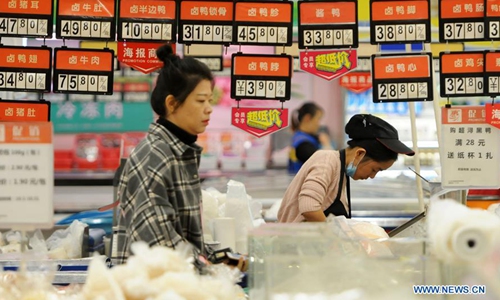HOME >> SOURCE
China's CPI hits 4.5% in Dec, stabilizing as pork-price growth levels
Source:Global Times Published: 2020/1/9 10:38:59

Photo: Xinhua
China's year-on-year growth in its consumer price index (CPI) was recorded at 4.5 percent in December, the same as in November and in line with market expectations, according to data released by the National Bureau of Statistics (NBS) on Thursday.
In 2019, the country's CPI grew 2.9 percent for the whole year, meeting the 3 percent goal set by the government.
The CPI, a main gauge of inflation, registered 4.5 percent year-on-year in December, level with November's recording which had hit an almost an eight-year high. China's CPI was recorded at 3.8 percent in October.
The growth stabilized as China's soaring pork prices begin to level out. In December, pork prices skyrocketed by 97 percent year-on-year, contributing 2.34 percentage points to overall CPI growth. Despite the high growth, the rise in pork prices had declined from 110.2 percent growth in November.
The price of vegetables increased 10.8 percent, while fruit dropped by 8 percent. In general, food prices rose by 17.4 percent year-on-year, while non-food prices rose by 1.3 percent on a yearly basis.
On a monthly basis, consumer prices neither rose nor fell in December.
Liu Xuezhi, a senior economist at the Bank of Communications, said that as pork prices gradually stabilize, CPI growth is likely to start dropping in the second quarter of 2020 but will remain at a relatively high level.
"This would limit the government's room to loosen monetary policy in 2020, and the government will rely more on fiscal policy to stimulate domestic economic growth," he told the Global Times.
The NBS also said China's producer price index (PPI), which measures the cost of goods at the factory gate, dropped 0.5 percent year-on-year in December, narrowing from a 1.4 percent drop in November.
Liu said the PPI decline has narrowed as the industrial sector stabilizes approaching the end of the year, but the fact that it is still falling indicates an "industrial deflation" mirroring weak market demand.
"But as government policies like tax cuts gradually take effect, and as the China-US trade war eases, PPI growth should bounce back into positive territory in 2020," he said.
Global Times
RELATED ARTICLES: